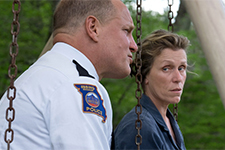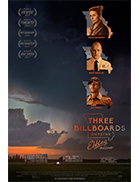Three Billboards Outside Ebbing, Missouri
|  There are precisely three decent characters in all of Martin McDonagh’s derisive drama Three Billboards Outside Ebbing, Missouri. One of them commits suicide halfway through the film. One of them is beaten to within an inch of his life and thrown out of a two-story window and is last seen covered in bandages in the hospital doing something nice for the person who put him there. And the third is humiliated in a restaurant and walks out in a state of pure dejection. I am honestly surprised that McDonagh didn’t go ahead and show him committing suicide in the next scene because that is the kind of film that Three Billboards is: bitter, angry, albeit weirdly sentimental in a way that doesn’t suggest any actual progress or growth or human feeling. The film’s protagonist is Mildred Hayes (Frances McDormand), a blue-collar mother from the titular town of Ebbing, Missouri, whose daughter was raped and murdered seven months earlier. In the film’s opening scenes, she decides to take out three contiguous billboards on a nearly deserted highway just outside of town to both express her rage and frustration and to jab at the police, who she feels have done nothing to bring justice for her daughter. On a bright red background and in bold black letters, the billboards together declare “Raped While Dying / And Still No Arrests? / How Come, Chief Willoughby?” It’s a bold and clever conceit to hang a film on, and if McDormand’s character had been only slightly more human, the audacity of her actions would have rung with genuine anger and desperation, rather than the same relentless sense of bitter self-aggrandizement that she evinces all throughout the film. It’s not hard to give her some leeway early on (she is, after all, a grieving mother haunted by her own actions just before her daughter’s horrific murder and left in a state of emotional and legal limbo by the lack of progress on the case), but by the end it’s hard not to be sick and tired of the manner in which she constantly uses that as an excuse to dehumanize everyone around her, whether it be her surviving teenage son (Lucas Hedges), a local with an inexplicable crush on her (Peter Dinklage), or the aforementioned Sheriff Bill Willoughby (Woody Harrelson), who isn’t so much a bad man as he is a complacent one. Oh, and he’s dying of prostate cancer, not that Mildred cares. As far as she’s concerned, Willoughby has exactly one identifying characteristic, and that is his failure to arrest someone for her daughter’s rape and murder. McDormand is a fantastic character actor who is capable of getting inside the skin of all kinds of complex characters, both dramatic and comedic. Her turn as Mildred is getting all kinds of critical raves, most of which hinge on her character’s unrelenting intensity; because American movies constantly fail to deliver powerful female protagonists, there is a tendency to latch onto and celebrate the exceptions, which Mildred certainly is. Her actions drive the narrative forward, and she refuses to bow down to any of the male characters, whether they be Sheriff Willoughby, his racist-idiot deputy Jason Dixon (Sam Rockwell), or her abusive ex-husband Charlie (John Hawkes). At one point, she literally hurls Molotov cocktails at the police station, the simplified symbol of all that is noxious in bureaucratic inertia; in human terms, the decent-but-ineffective Willoughy is the embodiment of the police’s laziness and contentment with itself, while the violent, hateful, and moronic Dixon embodies its corruption. Nothing remains unscathed. Playwright-turned-writer/director McDonagh (In Bruges, Seven Psychopaths) is just gifted enough to make you feel like you’re watching something important and penetrating, rather than just bilious. Maybe because he’s British and therefore an outsider to the blue-collar Midwest he’s depicting, he never gets beneath the surface of the class caricatures he peddles as representatives of American justice gone awry, and the whole film ends up feeling both slight and, like its protagonist, self-aggrandizing. There’s lots of profane language, radical tonal shifts, and unexpected narrative turns that keep you guessing what will be around each turn, and at some moments the film works in a brutal, jackhammer kind of way. McDonagh’s top-rate cast elevates the film to some degree, particularly Sam Rockwell, who manages to convey the kernel of humanity struggling to escape from beneath the layers of ingrained ignorance that define his character. But, far too much of Three Billboards trumps its humanity and empathy with vicious cynicism, which makes its goal of at least partially redeeming a handful of characters feel like little more than a hollow stab at stamping some sense of humanity on a film that otherwise wallows in the worst of it. Copyright © 2017 James Kendrick Thoughts? E-mail James Kendrick All images copyright © Fox Searchlight |
Overall Rating: 
 (2)
(2)


